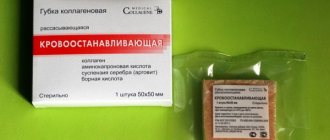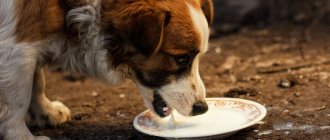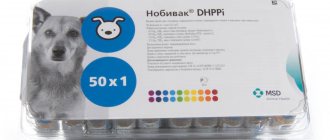Dogs cannot speak, and therefore, in case of illness, the owner can only guess why his faithful friend does not eat, hides in a dark corner, and even worse - diarrhea or vomiting begins. Moreover, vomiting and diarrhea can be symptoms of several dangerous diseases at once: plague, enteritis, viral hepatitis, poisoning with stale food or poison.
To make a correct diagnosis, you need a specialist. But sometimes it happens that you can’t go to the vet because the dog got sick on a day off, in the village or at the dacha. In such cases, there will always be well-wishers who will advise giving the dog vodka. The remedy is not controversial, many (though not all) veterinarians are opposed to it, but in the old days they treated pets with it.
Diseases for which dogs are given vodka
Vodka for a dog is an even more terrible poison than for a person: the animal’s body cannot easily tolerate the effects of ethanol. Therefore, there is no need to poison your four-legged friend with alcohol in case of any ailment.
Vodka is contraindicated if the cause of vomiting is viral hepatitis. It differs from distemper in that the dog’s stool is initially light (after a few days blood appears in it), and the urine is dark brown. The temperature in the first 2–3 days is normal, and then rises to 39–40 degrees.
With parvovirus enteritis, as with distemper, the dog loses its appetite, but it drinks water. There is a folk remedy for the treatment of enteritis, which includes egg white. Confusion has arisen: some owners decide that the protein should be mixed with vodka. The effect of a mixture consisting of raw egg white and water in case of a severe viral disease is already doubtful, and alcohol will only further burn the inflamed mucous membrane. Therefore, giving alcohol to a dog with enteritis is strictly prohibited.
First aid for poisoning
What can a loving owner do who is worried about the condition of his pet? It is very good if it is possible to understand what caused the poisoning of your four-legged friend.
But you need to act very quickly so that the poison does not penetrate deep into the body.
- The first thing to do is remove the poison. If it is food poisoning, then you need to do everything to induce vomiting. To do this, you can give your dog a saline solution (1 tablespoon of salt per glass of water) or half a glass of vegetable oil.
- Next, the sick animal is given an adsorbent: white clay or activated carbon. It binds and removes those toxic substances that did not come out with vomiting. If it is activated carbon, then the calculation is one tablet per 10 kilograms of dog weight.
- The next step is a laxative. You can give petroleum jelly or magnesium sulfate.
- And finally, intestinal lavage. It would be good if it was already done by a veterinarian.
If the dog is bitten by an insect, then a compress, always cold, or ice is applied to the affected area. If it is the bite of a poisonous animal, such as a snake, then all the poison must be removed.
If these are chemicals and they get on your pet’s skin, they must be washed off with plenty of clean water. If the dog has inhaled vapors of chemical compounds, then it is taken outside or into a well-ventilated room. The dog is also given vegetable oil in the amount of 2 tbsp. spoons, and then a laxative.
Has your pet gotten into the habit of peeing at home? Proven ways to wean him from a bad habit.
Another disease manifested by vomiting and bowel dysfunction is helminthiasis. Our article will tell you about the signs of worms in dogs.
Treatment of plague with vodka and egg
There are many varieties of Carré's disease, colloquially called distemper. This is a viral disease for which modern medicine does not know a cure. The best prevention is vaccinations. But if the animal still gets sick, doctors provide supportive therapy. Whether a dog survives or not depends on its immunity.
- refusal to eat and drink;
- lethargy and apathy;
- diarrhea and vomiting;
- desire to hide in a dark place (mainly in the nervous form of the disease).
Vodka helps only with the intestinal form of distemper and only if it is given to the dog at the very beginning of the disease. To prevent alcohol from burning the mucous membrane, it is mixed with an egg, which has an enveloping property.
To prepare the medicine, shake a chicken egg and mix it with vodka or cognac. The dog is given enough alcohol to make it fall asleep.
- for spaniels and smaller breeds – 0.5–1 tablespoon;
- for medium breed dogs – 1–2 tablespoons;
- for Great Danes, Alabais and other large breeds – 2–3 tablespoons.
A portion of the medicine can be given to the dog not immediately, but in 2-3 doses throughout the day, depending on the size of the animal and the reaction to the drug.
If the dog is vomiting, then before giving it vodka with egg, you need to give an injection of the antiemetic drug "Cerucal" (dosage - 0.5-0.7 mg per 10 kg of body weight). Vodka with eggs is given 2-3 times a day for 3-4 days. The medicine is drawn into a disposable syringe without a needle, which is carefully inserted into the corner of the mouth and emptied little by little so that the animal does not choke.
The egg softens the burning effect of vodka on the mucous membrane
As soon as the dog develops an appetite, the medication is stopped. On the first day, after a long hunger strike, an animal is given only light but nutritious dishes: meat broth, raw chicken eggs, and quail eggs for small purebred dogs (they increase immunity).
Vodka has a double effect:
- promotes the production of adrenaline, accelerates metabolism and partly serves as an immunostimulant, triggering the body’s protective functions;
- puts the dog to sleep. While the dog is awake, he experiences stress, which weakens the immune system. Sleep relieves stress and has a healing effect on the animal.
Vodka with eggs for a dog is not a panacea, but only an additional means to overcome the disease. When the animal is sleeping, you can carry out restorative therapy and give vitamin injections. You should take your dog to the veterinarian as soon as possible.
Recipes for treating dogs with vodka
If everything is clear about the type of disease and the dog does not have concomitant chronic ailments that may be a contraindication to treatment with vodka, the owner may consider using the following recipes. A prerequisite will be strict adherence to the specified proportions for each individual case.
With a plague egg
Vodka with a raw chicken egg is a common folk remedy for plague. There are many varieties of Carré disease (the official name of the disease), but there is no effective drug treatment for them.
For this reason, owners have to resort to folk advice as soon as the animal develops the following symptoms:
- depression and loss of interest in what is happening around;
- refusal of food and water;
- diarrhea and vomiting;
- photophobia and the desire to hide in the darkest corner of the room (typical of the nervous form of the disease).
An alcoholic cocktail helps mainly with the intestinal type of the disease and only if it is used in the initial stages of the development of the disease. To protect the mucous membrane of the pet’s digestive tract from burns, in addition to the drink, egg white is used to coat the inner surface of the stomach and other gastrointestinal organs.
The amount of vodka for 1 large egg is calculated individually:
- for small breeds - 0.5-1 tbsp. spoon;
- for medium dogs - 1-2 tbsp. spoons, depending on the weight of the pet;
- for large animals (for example, Great Danes or Alabais) - 2-3 tbsp. spoons.
Important! A measured portion of the medicine can be given in 2-3 doses during the day. This possibility is due to the pet’s individual reaction to the composition: if vomiting due to a large amount of alcohol, it is worth reducing its single dosage.
If the dog’s vomiting does not stop for a long time, then before using a mixture of vodka and eggs, it is worth giving an anti-emetic injection using Cerucal (0.5–0.7 mg/kg of the pet’s weight). The further course of treatment with vodka is 3-4 days, and as soon as the animal’s appetite normalizes, you can immediately stop using the alcoholic mixture.
When diagnosed with Carré's disease, vodka performs several important functions at once:
- promotes the production of adrenaline and acceleration of metabolic processes in the body;
- euthanizes the pet and protects it from unnecessary stress, which in turn negatively affects the restoration of the dog’s immunity.
Of course, an alcoholic cocktail is not a panacea for distemper, but under certain circumstances it may well help the animal cope with the disease.
With salt for poisoning
It is recommended to give vodka with salt to the dog even if, during a walk, the pet has eaten poison, which is often used to poison rats or pigeons. In such situations, an aqueous saline solution, which is poured into the dog’s throat with a syringe, helps well. As soon as the pet vomits, they give him vodka or cognac with salt (cognac is better). In order not to seriously injure the gastric mucosa, alcohol is first diluted with water in a ratio of 1:1 or 1:2. An alcoholic drink has a disinfecting effect: ethanol kills bacteria and speeds up metabolic processes in the body, ensuring a faster removal of toxins.
The main symptoms of poisoning will be:
- excessive salivation;
- anemia of the mucous membranes;
- lethargy and lack of appetite;
- bloody vomiting and diarrhea;
- dyspnea;
- tachycardia.
If your pet has severe bleeding from the anus or mouth, traditional methods may be powerless, and only immediate contact with a veterinarian will help save your pet. If the owner notices that the dog picked up something from the floor, its health began to deteriorate, but there is no blood yet, you can resort to treatment with vodka, being sure to observe the following dosage:
- for small dogs - 1-2 teaspoons;
- for representatives of medium breeds - 1-2 tbsp. spoons;
- for large dogs - 2-3 tbsp. spoons.
The required amount of salt can be determined experimentally: the product should acquire a pronounced salty taste and not seem bitter.
Did you know? Some dogs love beer very much, but an alcoholic product will undoubtedly be harmful to their health. To solve this problem, Megan and Steve Long's family from Texas came up with a special dog beer called Good Boy, which is based mostly on a plant-based brew with a meat flavor.
With garlic for worms
Among the “vodka” recipes of traditional medicine, dog owners also use those that are intended to fight helminths in the dog’s body. In addition to the alcoholic product, chopped garlic is used in this case. Due to the temporary immobilization of parasites under the influence of alcohol, much more of them are released during defecation, and the feces contain not only adult parasites, but also their eggs.
This alcoholic mixture is really effective, but in order not to harm the dog’s liver, it is better to use it in the most extreme cases, when there are no standard antiparasitic drugs and the pet is more than a year old. Such treatment is contraindicated for puppies, pregnant and lactating bitches. And in order to calculate the appropriate dosage for all other animals, you should always take into account their size and weight: for large dogs, a single dose should not exceed 2 tbsp. spoons of vodka, with a chopped clove of garlic added to it.
With vanillin against ticks
From early spring to late autumn, ticks are very active and can cause serious harm to a dog's health. Some of them are the causative agent of the dangerous disease piroplasmosis, which can lead to death within 3-4 days after the bite. To protect their pet, many owners resort to special collars, drops on the withers or tablets, but if these are not available, you can also use a folk remedy based on vodka.
Did you know? The tallest dog in the last few decades is deservedly considered a Great Dane named Zeus. He was included in the Guinness Book of Records due to his height, which at the withers was almost 112 cm.
To prepare a tincture against ticks and mosquitoes per 100 ml of alcoholic drink you will need 2 g of vanillin. After thoroughly mixing and infusing in a dark place for a week, it is poured into a spray bottle and sprayed on the dog every time before a walk. Despite the fact that vanilla tincture does not guarantee complete protection against insect bites, in the absence of alternative options it will be a relatively good solution.
Vodka with garlic as an anthelmintic
Some dog lovers use vodka with garlic as a dewormer. Garlic is an antiparasitic agent. Vodka temporarily immobilizes helminths, so that during bowel movements much more of them come out than usual. Alcohol has no effect on helminth eggs.
But alcohol is very harmful to the liver, so vodka with garlic can be given only in the most extreme cases, when no other deworming agents can be obtained. The product is contraindicated for puppies under one year of age, pregnant and lactating females. Vodka with garlic is much less effective than pharmaceutical preparations.
Vodka with vanillin against ticks
Ticks are a serious problem for summer residents. To repel ticks and mosquitoes, prepare a tincture of 100 ml of vodka and 2 g of vanillin. The product is infused for a week in a cool, dark place, and then poured into a spray bottle.
Before a walk, the hair on the dog’s belly, withers and paws is sprayed with vanilla tincture. When the fur is dry, the dog can be taken out.
Vanilla tincture does not provide a complete guarantee against insect bites; tar is more effective. But many owners prefer to use vanilla tincture, as it smells more pleasant than tar.
Vodka for severe exhaustion
People who are very cold drink a glass of vodka to warm up. Under the influence of alcohol, a person begins to sweat. But the dog does not have sweat glands, so it makes no sense to give alcohol to a dog that has fallen into an ice hole or been in the cold for a long time.
However, if the animal is exhausted to such an extent that it is impossible to palpate the veins and give an injection, even experienced veterinarians advise giving a little vodka. Alcohol will speed up your heart rate and blood flow, making it easier for the doctor to find the vein.
Symptoms of alcohol poisoning in dogs
When an animal is poisoned by alcohol, certain symptoms are observed, which amuse many people. But if measures are not taken, the pet may die.
Symptoms:
- Increased activity;
- Loss of coordination;
- Mood swings;
- Labored breathing;
- Frequent urination;
- Decreased body temperature;
- Vomit;
- Convulsions;
- Tremor.
When drinking a small amount of alcohol on an empty stomach, symptoms of poisoning may appear after 30 minutes, and on a full stomach, symptoms appear after 1-2 hours.
How to treat a dog with alcohol poisoning
If you know for sure that your pet got drunk, for example, licked spilled beer, then you need to give him activated charcoal, which helps remove alcohol from the blood, and immediately contact a veterinarian. A timely visit to the veterinarian gives a chance to save your pet. The veterinarian will check your blood alcohol level and perform an examination to detect damage to internal organs.
Your doctor may put you on an IV to help stabilize your blood sugar levels. An animal's recovery from alcohol poisoning lasts from 8 to 12 hours.
FAQ
Can a dog have beer?
You can't give beer to a dog. Some give beer instead of water, but this is not an option since beer does not quench thirst, but, on the contrary, leads to dehydration. With water, the animal receives the minerals necessary for the body, but beer does not replenish them, acting as a diuretic and washing minerals out of the body along with urine. Therefore, you cannot replace water with beer, although there is a special beer for dogs based on meat broth, which is much healthier than an alcoholic drink.
If a dog asks for beer after smelling it, is it okay to give it?
The question, of course, sounds stupid, and it cannot be answered. If you imagine that a child asks for beer, what normal parent will satisfy his desire? Dogs are like children, they need the care of their owner and cannot decide for themselves what is good for them and what is harmful. Beer, like other alcoholic beverages, is on the list of foods prohibited for pets.
Can dogs drink vodka if they are poisoned?
You should not give vodka in case of poisoning in order to save your pet. Indeed, in addition to the existing poisoning, after drinking vodka the dog will also become intoxicated. In case of poisoning, first of all you need to contact a veterinarian; if you don’t have time to go to the clinic, then you need to call the doctor and find out how to act in this situation. Maybe the pet is not poisoned at all, but has another disease. There are many cases when owners mistakenly believed that the animal was poisoned and gave it vodka, after which the pet died. Vodka does not provide a therapeutic effect in case of poisoning!
Why do dogs drink alcohol?
Some pets cannot even stand the smell of alcohol, while others are ready to drink it every day. Animals get used to alcohol much faster than humans. They may drink alcoholic beverages out of curiosity or thirst, but you need to understand that alcohol is harmful to dogs. Soldering a dog is nothing more than cruelty to an animal. Moreover, people who purposefully give alcohol to animals cannot explain the meaning of their actions, justifying themselves by saying that they are not able to refuse a pet when it asks, believing that a small amount of beer or cocktail will not harm the health of the animal.
Is it possible to give alcohol to dogs?
We'll tell you why alcohol is harmful to pets, how alcoholism threatens them, how to recognize ethanol poisoning and how to provide first aid. From the article you will learn in what cases alcoholic drinks are used for treatment, and how to ensure that alcohol therapy does not cause harm.
How does alcohol affect dogs?
Any drinks containing alcohol act on them in the same way as on people, only faster. And the animal needs to drink much less, just a few milliliters, to get the same effect. Dogs also become alcoholics. It only takes them a month or two of drinking (less than a person) to become addicted to alcoholic beverages.
Being intoxicated is a poisoning, even if it doesn’t seem so at first.
In dogs that like to “drink”, all internal systems are affected: cardiac, respiratory, liver is irreversibly changed, acute renal failure develops, blood sugar drops, convulsions and coma occur. Many of these conditions are incompatible with life.
And besides this, there is still a hangover, from which the dog will suffer no less than a person. The dog will be inadequate, and even if he was not very friendly when sober, then with a hangover he will become angry. Are you ready to subject him to such a test?
Low alcohol drinks
A dog's reaction to drinking beer or wine will be similar to that of a person. Sound sleep or, conversely, agitation, inappropriate behavior (loud barking, running, jumping), loss of control over one’s movements (uncertain gait), disorientation.
Strong alcoholic drinks
Signs of intoxication with vodka and whiskey will be similar, but more pronounced - it all depends on the dose received per kilogram of weight, the strength of the drink, etc. The animal will almost certainly be poisoned, injured, may become aggressive and even, being drunk, attack its drunken owners. After 1.5-2 hours he may vomit.
Special "alcohol"
A person forces a pet to become alcohol dependent solely out of love for him, the animal. Harmless “alcoholic” drinks were invented for the dogs of such owners. For example, the Japanese “Woof-woof beer” (“Wan Wan Beer”), the American dog grog “Dawg Grog” and “Bowser Beer”, in the UK “Dog Beer” - the smell of beer, the taste of beef.
Symptoms of poisoning
They appear after one to three hours if the dog “drank” (even a little) on a full stomach, and within half an hour - if on an empty stomach.
She was poisoned if she:
- weakness, lethargy, lethargy;
- vomiting blood;
- diarrhea;
- painful stomach;
- frequent urination (including in inappropriate places);
- foam at mouth;
- labored breathing;
- dehydration;
- unconsciousness, coma.
Alcohol from the stomach does not enter the blood all at once, so the symptoms of poisoning will not appear simultaneously, but will increase in intensity gradually.
The dog drank alcohol: what to do?
What to do if you witness this? Trigger her gag reflex. To do this, give her vegetable oil, a solution of water and 3% peroxide or lightly salted water in large quantities.
You can simply put some salt on the root of your tongue. Vomiting will free the stomach from alcohol, and it will not be absorbed into the blood. After or instead, give the dog a sorbent, such as activated carbon.
It neutralizes ethanol and other toxins.
Do not self-medicate. After providing first aid, take your pet to the clinic, where he will be tested for ethanol in his blood and given intravenous medications against intoxication and dehydration.
Why don't dogs like the smell of alcohol?
Canines naturally avoid consuming fermented products, including alcohol. Only elephants and monkeys can experience the pleasure of intoxication. And another person. Dogs are predators; they know at the genetic level that a disoriented animal becomes a very easy prey. In addition, a dog's sense of smell is thousands of times better than a human's. Imagine how a drunk person smells!
What to do if he asks?
Rephrase the question: who is the owner - the dog or you? Is the answer obvious? A pet is like a child who does not understand what is healthy and what is not. And you understand. If the dog asks, distract him, engage him in play, slip him a treat. Be firm in your prohibition. Make sure that she does not come across alcohol, even by accident.
When alcohol can help
Giving alcoholic beverages to dogs for medicinal purposes is a very controversial step. How they will affect a particular dog is unknown.
Attention! We do not recommend using the information below! DO NOT treat your dog with alcohol! Alcohol is dangerous to the life and health of your pet!
From the plague
Canine distemper, or Carré's disease, is a dangerous viral disease of dogs.
Distemper is treated with alcohol only if:
- there is an intestinal form;
- the medicine is given at the beginning of the disease;
- the symptoms are not very pronounced;
- the animal has strong immunity.
In other cases it will be useless; with similar parvovirus enteritis and viral hepatitis - dangerous.
Mix vodka or cognac with one chicken egg, you can add honey (1 teaspoon). Take 0.5-1 tablespoon of alcohol for a small dog, 1-2 for a medium dog, 2-3 for a large dog. Let's do it in several passes throughout the day.
Vodka works as a deep anesthesia. It will relieve stress in the animal, speed up metabolism, and launch the body’s defenses. The egg will protect the gastric mucosa from alcohol. Treat vomiting with an injection of Cerucal (0.5-0.7 mg per 10 kg).
From worms
For deworming, vodka is mixed with garlic. The composition will help worse, like special drugs, so use it as a last resort. Remember that both ethanol and garlic are poisonous to dogs. Do not give the mixture to puppies, whelps or lactating bitches.
When exhausted
Intravenous infusions of drugs help with exhaustion, but it happens that the veins cannot be felt. Then letting your dog drink vodka is a justified risk: it will speed up the heartbeat, increase blood pressure, and it will become easier to find a vein.
In case of severe hypothermia, a person drinks vodka to sweat. This method of warming up is not suitable for dogs, since they do not sweat.
In case of poisoning
A dog can become poisoned on the street with poison for rats and pigeons. First of all, induce vomiting in the dog (vegetable oil orally, brackish water enema). Drink cognac with salt.
To do this, dilute the alcohol (1-2 teaspoons for small dogs, 1-2 tablespoons for medium ones, 2-3 tablespoons for large dogs) with water 1:1 or 1:2, add salt to make it very salty.
The mixture disinfects, accelerates metabolism, and detoxifies.
Against ticks
A mixture of 100 ml of vodka and 2 g of vanillin, left for a week, is an external remedy for repelling ticks and mosquitoes, not the best, but it smells nice. Spray the fur with it before a walk, and let it out of the house after it has completely dried.
Briefly about the main thing
- Dogs should not be given alcoholic beverages. Alcohol is deadly poisonous to dogs.
- A drunk dog needs immediate detoxification at home and a trip to the vet if necessary.
- It is not recommended to treat your dog with alcohol! If you decide, at your own peril and risk, be sure to show it to a veterinarian afterwards.
Source: https://PetGuru.ru/pitanie/mozhno-li-davat-alkogol-sobakam











